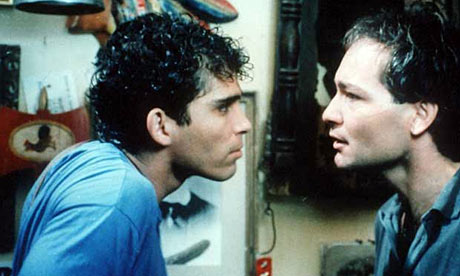
Fresa y Chocolate is in many ways the continuation of Memorias del Subdesarrollo. The Cuban intellectual figure lives on with Diego, though always in reference to Sergio. To some extent, the questions of indecision and intellectual alienation are eliminated, but there is still a sort of violence that lives on in this era, that has little to do with the luxury of choice that Sergio had in Memorias. Diego is much more decisive and sure of himself as a revolutionary and an intellectual, but Cuba has no space for this gay man even if he chose to stay. The silent violence that remains when the film ends – a moment that is ostensibly the joyous embrace between two friends – is very troubling, and it seems eternally more grounded in the real than any of Sergio’s problems ever could have been. The issue that kept resurfacing for me was that of the “insult.” How could Diego be so willing to keep living in a country that insulted his very existence? What could bring about the obvious passion with which he led his life? Art seemed to be a force that Sergio lived for, something that grounded him at the same time that it elevated him as an intellectual. His distinction between art and propaganda is very important. It speaks of this notion of embodied knowledge – knowledge that cannot be “transmitted” in words through the radio waves – but rather, is profoundly “felt,” as Diego testifies. The presence of art throughout the film is also a reference to the cinematic medium itself. Alea seems to be pointing to the fact that he is not so interested in making propaganda films anymore. Though Alea is still funded by the ICAIC for this film, Fresa y Chocolate is not a movie that cares much for censorship.
David is such an important addition to this story. Memorias del Subdesarrollo never addressed the “militant” revolutionaries in Sergio’s world – they were merely background elements whenever he roamed the streets of Havana. On the other hand, Fresa y Chocolate has the audience confront the very bodies that are involved in revolution. They are not objectified, as the women were in Memorias. Sergio even thinks originally of David in a merely physical way, but eventually the film asks us to look deeper, just as Sergio has to. The audience also has to engage with the journey that David’s mind had to go through. Up until the very end he was in denial that Sergio’s exile was a forced one. He too must immerse himself in an artistic world beyond that of propaganda in order to realize that his friend is incapacitated from action because of the very system that sustains his life.
Fresa y Chocolate was a valuable film for Alea to have made. It might be a little bit more simplistic than desired – the choice of genre certainly contributed to this – but as I have mentioned before, the silent violence of the end is what remains captivating. The film is not as lighthearted as it seems. I do wish that it had engaged more with issues of race and gender, especially because in the end the embrace between Diego and David seemed to represent an idealized sense of fraternity that is definitely part of the rhetoric of the nationalist revolution.
No comments:
Post a Comment